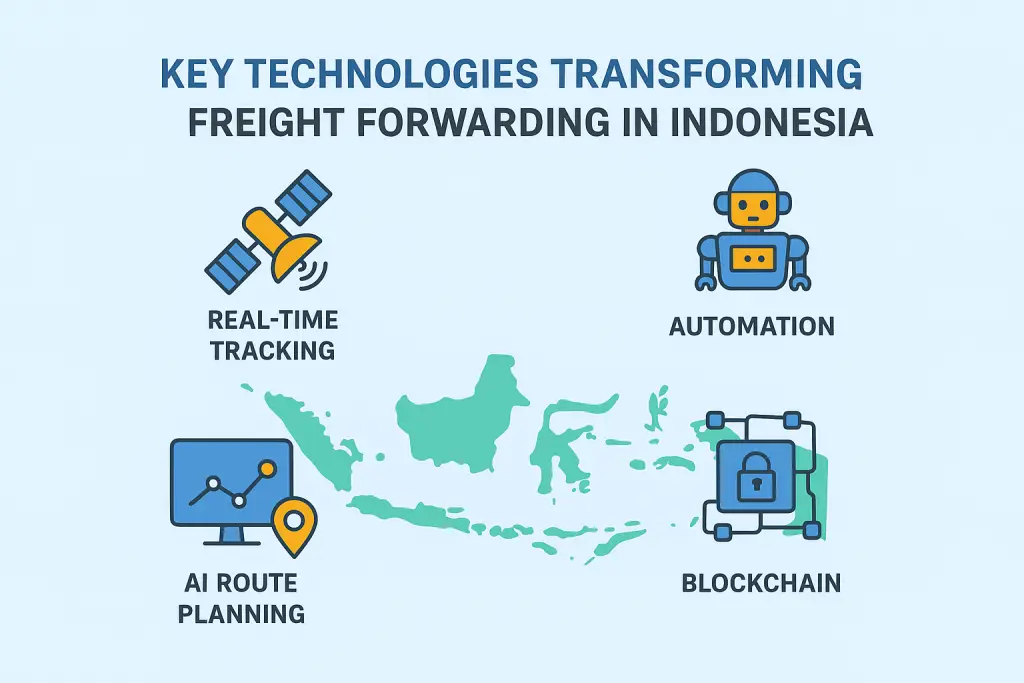The freight forwarding industry in Indonesia is rapidly transforming thanks to advances in technology. Digital innovation is no longer optional – it is essential for companies who want to stay competitive in a complex logistics environment.
The Need for Technology in Indonesian Freight Forwarding
Indonesia’s geography, which includes thousands of islands, coupled with a fast-growing economy, has made the logistics and freight forwarding sector highly challenging. Traditional manual processes lead to inefficiencies, errors, and delays.
Technology provides the tools to overcome these hurdles by streamlining operations, improving communication, and providing real-time visibility into shipments.

Key Technologies Revolutionizing Freight Forwarding
-
Track and Trace Systems:
Real-time tracking systems powered by GPS and IoT devices allow customers and companies to monitor shipments at every stage. This transparency builds trust and enables proactive problem-solving if delays or damages occur. -
Automation and Digital Documentation:
Automating paperwork—from customs declarations to invoices—reduces human error and speeds up clearance times. Electronic Data Interchange (EDI) systems connect freight forwarders with customs and shipping companies for seamless data flow. -
Artificial Intelligence (AI) and Machine Learning:
AI helps optimize route planning and load consolidation, predicting potential bottlenecks and offering efficient alternatives. Machine learning algorithms can forecast demand and capacity needs to improve supply chain planning. -
Blockchain for Security and Transparency:
Though still emerging, blockchain technology promises a tamper-proof ledger of shipping records that enhances security and trust among stakeholders.
Benefits of Digital Transformation
-
Operational Efficiency:
Automation reduces manual work, saving time and costs while increasing accuracy. -
Improved Customer Experience:
Clients receive up-to-date information anytime, enhancing satisfaction and reducing inquiries. -
Scalability:
Technology solutions grow with your business, supporting increased shipping volumes and complex routes. -
Sustainability:
Optimized routes and resource use reduce carbon footprint, aligning with green logistics goals.
Challenges and Industry Response
Barriers to digital adoption in Indonesia include limited infrastructure in remote areas and regulatory requirements still catching up with new technologies. However, government initiatives and private sector innovation are closing these gaps rapidly.
For example, the Smart Logistics International Workshop 2025 in Tangerang pushed digital transformation agendas that aim to lower logistics costs and increase competitiveness.
Alfian Logistics and Digital Innovation
At Alfian Logistics, investment in cutting-edge freight forwarding software and integration with global digital platforms ensures clients benefit from accurate tracking, smooth customs processing, and real-time communication.
(Internal Link: Discover Alfian Logistics digital freight forwarding solutions)
External References
-
A comprehensive study on digital innovation impact: Improving Freight Forwarding Efficiency Through Digital Innovation – DIJEFA
-
Insights on Smart Logistic Workshop and digital transformation: INDUSTRY.co.id report
-
Revolusi teknologi dalam layanan freight forwarding by Oaktree: Oaktree.id blog

